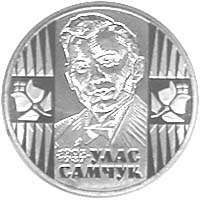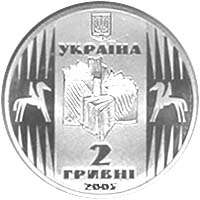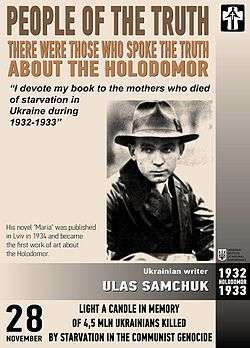Ulas Samchuk
Ulas Samchuk (Улас Олексійович Самчук) (20 February 1905 Derman (now in Rivne Oblast) - 9 July 1987 Toronto, Ontario, Canada) was a Ukrainian writer, publicist and journalist, member of the Government of the Ukrainian People's Republic in exile[1].
Ulas Samchuk | |
|---|---|
| Born | |


Biography
He was born February 20, 1905 in the village Derman in a peasant family. From 1917 to 1920 he studied at a four-grade elementary school in Derman. In 1921-1925 he studied at the Kremenets Ukrainian private gymnasium. Before he finished his secondary education, he was called up for service in the Polish Army in 1927, and later deserted in August of that year. He escaped to Germany. At first he worked delivering coal. With the help of a supportive German family, Samchuk continued his studies at the University of Breslau. In 1929, Samchuk moved to Prague, Czechoslovakia. He was attracted by the city’s vibrant Ukrainian community and the Ukrainian Free University in which he enrolled, and where he was active in the Students’ Academic Society. Ulas Samchuk considered Oleksandr Oles, Spiridon Cherkasenko, Oleksa Stefanovych, Oksana Lyaturynska, Oleg Olzhych, Mykhailo Mukhyn, Mykola Butovych, Robert Lisovsky, Stepan Smal-Stotsky, and Dmytro Doroshenko to be among those who created "his Prague" at that time. He graduated Ukrainian Free University in 1931. In 1932, while in Prague, Samchuk first heard about the holodomor unleashed by Soviet dictator Joseph Stalin upon the Ukrainian people. He travelled back into Soviet Ukraine to witness the horror firsthand, and in response wrote the novel Maria (1934)––the first literary work about the famine, and a powerful characterization of village life[2] at the time. In 1937, on the initiative of Yevhen Konovalets, a cultural office of the Ukrainian nationalist leadership headed by Oleh Olzhych was established. Prague became the center of the Cultural Office, and one of the main institutions was the Section of artists, writers and journalists, chaired by Samchuk.
In 1941 he returned to Volyn as a member of one of the OUN marching groups, where from 1941–1942, worked as editor of the newspaper Volyn', before fleeing to Germany in 1944, where he founded and headed the literary-artistic organization MUR until 1948. In 1948, he emigrated to Canada and became the leader of the Slovo Association of Ukrainian Writers in Exile.
The writer died in Toronto on July 9, 1987[3].
Legacy
He published his first short story, "On Old Paths", in 1926 in the Warsaw magazine Nasha Besida. In Samchuk's most outstanding work, the "Volyn" trilogy (I-III, 1932-1937), a collective image of a Ukrainian young man of the late 1920s and early 1930s is derived, which seeks to find Ukraine's place in the world. From 1929 he began to collaborate regularly with the "Literary-Scientific Bulletin", "The Bells" (magazines published in Lviv), "The Independent Thought" (Chernivtsi), the Nation-Building (Berlin), and the Antimony (without a permanent location). Samchuk concurrently wrote the novel "Kulak"(1932) about the eternal commitment of the Ukrainian peasant to tilling the land and the undying optimism of farmers. His next important work was the two-volume novel "The Mountains Speak" (1934) which explored Carpatho-Ukraine’s struggle against Hungary.[2]
In 1947 he graduated from the drama "Noise of the Mill". The unfinished trilogy "Ost": "Frost Farm" (1948) and "Darkness" (1957), depicts the Ukrainian man and his role in the unusual and tragic conditions of interwar and modern sub-Soviet reality.
The topics of Samchuk's latest books are the struggle of the Ukrainian Insurgent Army in Volhynia (the novel "What Doesn't Heal Fire", 1959) and the life of Ukrainian emigrants in Canada (On Hard Land, 1967). Memoirs of "Five to Twelve" (1954) and "On a White Horse" (1956) are devoted to the experience of the Second World War[4].
Works

Ulas Samchuk major works include:
- Volyn (1932-1937)
- Kulak (1932)
- Mountains Are Talking [Hory hovoriat] (1934)
- Maria (1934), (English translation, Maria. A Chronicle of a Life[5] 1952)
- Youth of Vasyl Sheremeta (1946-1947)
- Moroz’s Khutir [Moroziv khutir] (1948)
- Darkness [Temnota] (1957)
- Escape from oneself [Vtecha vid sebe]
- People or Servants? [Liudy chy chern]
- Five Past Twelve [Pyat po dvanadtsiatiy] (1954)
- On a White Horse [Na bilomu koni] (1956)
- On a Raven Horse [Na koni voronomu]
- What Fire does not Heal [Choho ne hoit ohon] (1959)
- Where does the river flow? [Kudy teche richka?]
- On Solid Earth [Na tverdiy zemli] (1967)
- In the Footsteps of Pioneers: The Saga of Ukrainian America (1979)
Bibliography
- Ułas Samczuk, Wołyń, wyd. 2 (reprint), ISBN 83-88863-14-2 Biały Dunajec — Ostróg 2005, wyd. «Wołanie z Wołynia»
- Самчук У. Гори говорять. — К., 1996.
- Самчук У. Волинь: У 2 т. — К.: Дніпро, 1993. — Т.1, 2.
- Самчук У. Дермань. Роман: У 2 ч. — Рівне: Волинські обереги, 2005. — 120 с.
- Самчук У. На білому коні. — Львів: Літопис Червоної Калини, 1999.
- Самчук У. На коні вороному. — Львів: Літопис Червоної Калини, 2000.
- Самчук У. Темнота. Роман. — Нью-Йорк, 1957. — 493 с.
- Самчук У. Чого не гоїть огонь. — К.: Укр. письменник, 1994.
- Самчук У. Юність Василя Шеремети: Роман. — Рівне: Волин. обереги, 2005. — 329 с.
- Волинські дороги Уласа Сачука: Збірник. — Рівне: Азалія, 1993.
- Гром'як Р. Розпросторення духовного світу Уласа Самчука (Від трилогії «Волинь» до трилогії «Ost») // Орієнтації. Розмисли. Дискурси. 1997—2007. — Тернопіль: Джура, 2007. — С. 248—267.
- Улас Самчук. Ювілейний збірник. До 90-річчя народження. — Рівне: Азалія, 1994. 274
- Тарнавський О. Улас Самчук — прозаїк // Відоме й позавідоме. — К.: Час, 1999. — С. 336—350.
- Ткачук М. П. Художні виміри творчості Уласа Самчука // Українська мова і література в школі. — 2005. — № 6: — С. 43-47.
References
- "Ulas Samchuk Biography". www.languagelanterns.com. Retrieved 2020-05-18.
- "Ulas Samchuk Biography". www.languagelanterns.com. Retrieved 2020-05-18.
- "Ulas Samchuk". www.myslenedrevo.com.ua. Retrieved 2020-06-20.
- "Ulas Samchuk". www.myslenedrevo.com.ua. Retrieved 2020-06-20.
- Samchuk, U., 1952, “Maria. A Chronicle of a Life, Language Lantern Publications, Toronto, (Engl. transl.)